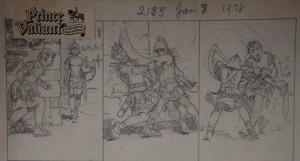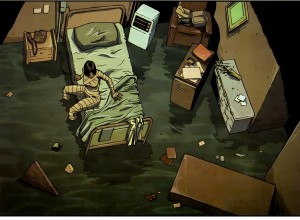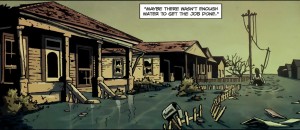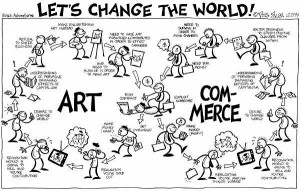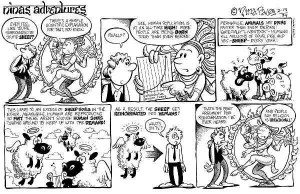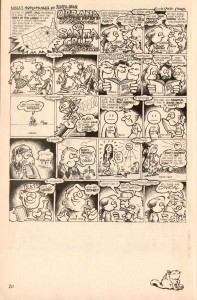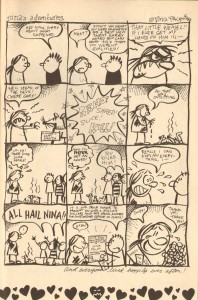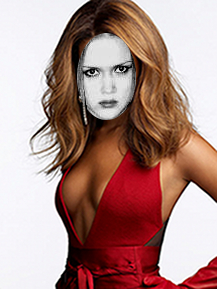Dyspeptic Ouroboros is a new occasional series here on HU in which artists, critics, and other folks talk about the relationship between art and criticism.
To kick things off, I’m publishing an interview I conducted with Daphne Carr. Carr is the series editor for the Best Music Writing series. She blogs at funboring.com, and her book in the 33 1/3 series on Nine Inch Nails’ Pretty Hate Machine will be out in September. We talked by email in February. A shortened version of this interview appeared on Madeloud.com.
________________________________________
Noah Berlatsky: The Best Music Writing series is somewhat unique in the sense that there hasn’t been a successful “Best Book Review” or “Best Film Writing” series (I guess there was a “Best Film Writing” book or two, but it seems to have gone belly up after a year or so.) Do you think writing about music occupies a different cultural place than writing about other kinds of pop culture? And if you do, do you think that’s because of an intrinsic difference in the way people respond to music versus other art forms, or is it because of the historical development of music criticism, or some other factor?
Daphne Carr: Music occupies a different cultural space than do other forms of fine art (for sure) and mass-distributed art because it is ubiquitous in contemporary life, it permeates nearly every moment of our public lives (with or without permission) and is part of much of our private lives. Along with that music is also a form of communication that privileges the poetics and emotional content as much or more than denotative meaning, which makes it a rich “text.” Of course there is also music as a culture, music as a social context or as an element that heightens the meaning of social gatherings for many people, which makes it important when writing about how we live our lives and make sense of the world. So there are a lot of ways that music is different than any form of art fixed in material or any work that exists in restricted spaces. I could go on and on…
One of the things I love most about BMW [the Best Music Writing anthology] is that many of my favorite pieces come from writers who do not consider music to be their primary object. There is a sense that anyone who has cultivated a writing style and who has passion and time can write a great piece about music, whereas I think some of the other fields of art like literature, film, and fine art have more canonical theoretical approaches one is supposed to have mastered before beginning to criticize. While some lament the lack of a body of theory for the analysis of popular music, I think the sort of wild mixture of approaches—from lyrical analysis to memoir—is its strength. It also makes my job really hard because people are writing from all over the place.
Just a note of clarification by the way, I track down and read work about any kind of music, not just “popular” music. I don’t have a bias against art music in any way.
What do you think the role of writing about music is? Is music writing to help people make consumer choices? To help them understand music better? Is it entertainment? Is it art in its own right?
Of course music writing can also be entertainment, and can also be art. It’s a huge field with so many different kinds of writers in it, from poets to content writers.
As far as music criticism goes, one of the primary skills of a critic is to be a filter. It’s the “we suffer so you don’t have to” model, a division of labor where critics give attention to things that the less active, less obsessive listeners would or could not. The filtering result of a review used to be that readers wouldn’t have to suffer by wasting money on wretched LPs or CDs, and now maybe it’s just that listeners won’t waste as much time. Or, if the reviewer favored something that was unusual, it might get bumped up in sales and appreciation. That said, the circulation model of music and music criticism has changed so dramatically with online distribution/publishing that I think it is not easy to compare it with the print-media and physical copy era.
I know you read a ton of music criticsm for the Best of series every year — and that the final books reflect the individual editors, rather than your personal taste necessarily. So I’m curious if there’s a type or kind of criticism that you especially despise, or that you feel is not doing what criticism should do. (I noticed on your blog you were dreading the onslaught of Michael Jackson tributes this year — is that, for example, a dislike for that kind of article in general, or just a weariness that there’s going to be so many of them?) Is there an example you could give maybe of a critic or a piece you especially dislike?
A note about the question – I consider music criticism just one small sub-field of “music writing.”
Well, there is one thing I won’t tolerate when I read music writing for the book, and that is work that is obviously, unquestionably racist, sexist, or homophobic. Of course there is a big difference between reporting on artists or scenes in which these attitudes exist, which I consider to be an important and underdeveloped part of music writing, and the writer him or herself advocating hate.
The only other thing in criticism I despise is writing that recreates either press releases or preexisting reviews. If I see the same sets of adjectives used in multiple reviews, I start searching to see what the first source was and how much more of the content and style is similar. Its astounding how often writers do this. It’s lazy, immoral, and embarrassing to and for the whole writers’ community.
Also I was not dreading the onslaught of MJ pieces, only the fact that we can’t publish all the good ones. If a publisher wants to do it, contact me and I will either give you all the pieces or I can help you put the book together myself. Seriously, that book should happen.
In contrast, is there a kind of criticism you’re especially interested in, or feel are particularly what criticism should be doing?
The thing about BMW is that it is not a collection of original essays. I literally take what comes. The pieces that always thrill me are the ones that present artists, musical works, scenes, or philosophical questions about music in fresh ways, often with novel structures, solid craft (however manic in style), firm opinions backed up by clear arguments, works written with passion and that have been clearly edited, fact-checked, and spell checked (although there are exceptions, usually blogs that read like some post-midnight inspiration). I like to read work that seems engaged with other parts of the world beyond music, be it other forms of culture, history, politics, or literature (that said, I like a well-written bit of inside baseball too). Given that music writing is often a commercial art, I like writing that fills up the space given to it in the most original way, and work that, like popular music itself, calls attention to and critiques its commercial origins and constrained formats. That’s why I loved Mike McGuirk’s Rhapsody capsule reviews and Paul Ford’s Six Word Reviews although the latter was more of a critique of concept of critical listening in the digital age or at the mega-festival. Greil [Marcus, editor of Best Music Writing 2009] called it “dada provocaton art.” We should have ran the whole damn thing.
Criticism, as a sub-field of music writing, should be engaging in the sound and culture of the musical object in question, and should engage and provoke the reader to listen and/or think more, more clearly, or differently about music, language, or the world. The best pieces create discussion for a long time afterward, change a reader’s mind, and even change their lives. I was definitely changed by reading Katy St. Clair’s piece A Very Special Concert. It gave me a new contextfor understand both the mentally retarded people and the people who work in supporting them (not to mention, it made me respect Huey Lewis). A similar thing happened with the John Jeremiah Sullivan piece “Unknown Bards” from last year’s book. In the piece Sullivan recounts a fact-checking call with John Fahey that is equal parts funny, sad, and startling. The whole piece is an argument for stubborn devotion to listening, to questioning and re-questioning one’s ears, and to cultivating an exhausive and critical mental archive. John Fahey was one of the people who did this, and his death is a great loss to scholars as well as the listening world. This piece got me set to march out the door once again. I don’t want to be all “salvage” about it, but there is a lot of work music writers can do just by knocking on a door, being kind enough to get invited in, and sitting down to listen. With a recording device on, of course.
I am witnessing this first hand because a dear friend of mine, Keith Jones, is putting together a . documentary on the punk scenes of Africa. He is focused primarily on South Africa, and in his work he has been doing exactly that—knocking on doors of total strangers—and finding that many of these brave musicians (many of whom played in multi-racial bands under Apartheid) haven’t talked about their experiences since they happened. I’m prodding him to take the huge archive of interviews, photos, and flyers that can’t possibly make it into the film and and to do a book with them, because this is not just important for music history, but the history of South Africa.
There are so many more books like this to be written. When you start doing a book like that, you also realize how desperately important first hand accounts of concerts, band practices, and recording sessions are, as are reviews that give a historian some insight into the way people listened at the time. The best criticism is both completely of its time and evergreen in this way, and it is a joy to find. I suggest Ellen Willis’s report on Woodstock if you need an example. Read it even if you don’t.
I know you are working on a PhD., and that many of your own essays are focused on the intersection between art and broader social and intellectual movements. Is that the sort of thing you generally like to see criticism doing, or are there other models? Is there a book or essay you could give as an example?
Again this question is more about music writing than criticism, I will work from that angle.
My own personal career in writing about music and studying music culture has given me the opportunity to participate in many different writing contexts and to read so many different styles of music writing. Of course it has also shaped my opinions about all three of the words in the book’s title: “Best” (cultivation of skilled value judgments) “Music” (notice no qualifier “popular”) and “Writing” (crafting language).
I started off as a zine writer and moved to criticism in college. My own preference was always more for features, and a big part of going to grad school was my desire to expand my research methods and hone my critical reasoning skills. My reading of feminist theory, anthropology, and philosophy of science has made it basically impossible to accept the premise that there is a universal position from which to make “absolute” value judgments. Still, it’s possible for me to love writers who stick by this approach. It’s like a cookie fortune, but instead of adding “…in bed,” I mentally add, “…or so (s)he thinks.” That is a really long way of saying, yeah I can read, evaluate, and enjoy things that I would never personally write, of course.
I guess I keep ignoring your request to give examples, and maybe that’s because I don’t want to play favorites in a field where writers’ styles can change dramatically from piece to piece, and when even the most average writer can happen upon a story so good they merely have to keep the facts straight. Also, when I was first starting to write about music I would read interviews with music editors and they would talk about who the greatest writers of the next generation were and I would feel really defeated. I never want to make a writer feel that way, because we do this thing out of passion, and we have potential to get better if we keep working, get good feedback, and pay attention to the world, and never stop listening to new music.
There are some 3,500 email addresses in my database for BMW, and I am sure that I am missing a lot of people besides those. There are people doing great work all over the world—folks like Anwyn Crawford in Australia—and every year I have the good luck and pleasure of finding more and more of them. I do my best to find new voices for the book, and welcome anyone to submit their own work or the work of other people to me. Yeah, there are some “usual suspects” in each book, but at least half of the writers are coming from solicited and unsolicited works from the world, from my stacks of magazine subscriptions, my RSS feeds, and my trolling of blogs. Oh yeah, and Twitter.
And, if pinned down I might say “Frank Sinatra Has a Cold” by Gay Talese is the piece of music writing I wished I’d written, and that the whole archives of Ann Powers, Simon Reynolds, and Greg Tate are not to be missed by lovers of music and writing. Of course, I am biased towards Ann, who is guest editing this year and is one of my writing heroes. Ellen Willis is another hero and she will finally get the anthology of music criticism she deserves, Out of the Vinyl Deeps, this September. The full disclosure is that I co-wrote the afterward with Evie Nagy. I’m really proud of that book, and happy that Ellen’s daughter Nona put it together while working on her Girl Drive project.
I was listening to a joint discussion you had with Douglas Wolk on Soundcheck a year or so back. You both seemed pretty down on snark. You in particular seemed to be arguing that critics should try to understand and analyze, if not exactly go beyond, their scorn for, say, Vampire Weekend. I guess, as someone who writes and enjoys the odd bit of snark, I wondered if you felt that just dumping on a record was never a valid move? And is that coming from a popism perspective in some ways (I’m thinking of Carl Wilson’s Celine Dion book especially here, I guess.)
I feel like snark is a tool best used to undermine power, not to reassert it. Snark is a portmanteau of snide remark, and as such serves as a kind of sly witticism meant to serve its object of derision. When it’s done well, it’s a swift comeuppance to some over-esteemed icon. But when someone is being snide from a position of power and the object of the remark has done nothing to deserve it—really, just provides the set up for some joke—I feel like that’s a form of malice, a kind of abuse of power.
My metric for evaluating snark doesn’t really come from poptimism, it is my own personal ethics. I do share a lot of the poptimist philosophy towards musical listening and writing style, especially as qualified by Jody Rosen some years back.
You and Douglas also seemed to be objecting to, or wanting to see fewer, short reviews and blurbs. Do you think that music criticism has gotten shorter? Or has the internet actually allowed for longer projects than in the past? And do you think the change you see (for shorter or longer) is a good thing or a bad thing?
What I meant in that rant was that as the digital archive of music writing gets deeper, there will certainly be a lot of redundancies if everyone is writing short, mostly factual pieces that have a tiny bit of critical engagement, which is what most blurbs are.
The trend seems to be that print writing is now shorter and that professional online music publishing is finding some consensus or standards on average lengths for writing types. There’s always room for the 10,000 word essay on hauntology, and that I welcome. Long live chaos! I certainly wish that there were new funding models for all of this great chaos.
To get back to the Best Music Writing series for a minute — it seems like some of the most interesting music writing is often being done now in formats that don’t easily lend themselves to anthologizing. How do you deal with that? Are there pieces that you want to include but just can’t because they’re based around youtube clips or visuals or are just too long or fragmented?
I do think that there are an increasing number of pieces that are hybrid to the point of being multimedia in their creator’s conception not just in their subsequent editorial design. I see these things as their own form of new media art. Some of it, like podcasts, are really new media broadcast. There are other media that do music criticism well, for instance, a lot of experimental music is meta-musical critique, and videos like the “literal videos” and “….Shreds” series are forms of music criticism as well. There’s so much great stuff!
At the end of the day, I have to draw a line. For now it is English-language writing about music published in some kind of periodical. I’ve daydreamed about doing a visual and/or online component to the book, but my job is big enough just dealing with periodical texts. In an ideal world, I’d have a whole BMW office that could have a multimedia editor, and we’d keep all the publications, links, and videos as an archive that could serve as research for current and future generations of music scholars.
Finally…I wondered if you could talk a little about your PhD. thesis and your upcoming 33 1/3 book on Nine Inch Nails.
The Nine Inch Nails book, Pretty Hate Machine, will be out on Continuum in September 2010 and I am planning a launch event that will be in the spirit of both the old and new Nine Inch Nails. Stay tuned. I will also be doing readings on the East Coast through the fall, especially in September. If any group of 15 or more NIN or music writing fans gets together in a place where I can travel by public transportation (subway, bus, commuter rail, train) and plans a public event I will come do a reading. Email me musicwriting@gmail.com
As for the dissertation, ask me in May 2012.

